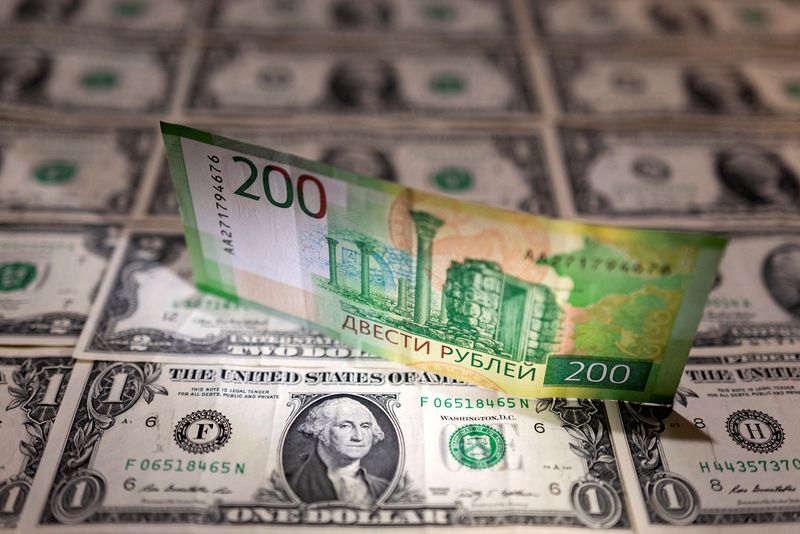(Reuters) -The Russian rouble fell in light trading in Moscow on Friday, with trading on separate exchanges stabilising beyond 100 to the dollar, after the central bank opted to hold rates at 20% and said it would start purchasing OFZ government bonds.
The central bank kept its key interest rate unchanged on Friday, in line with a Reuters poll of analysts, following an emergency rate hike in late February, but warned of higher inflation and an economic contraction this year, without giving new forecasts.
The central bank's actions have come in support of an economy buckling under the stress of sanctions from across the globe, triggered by Russia's invasion of Ukraine late last month.
U.S. President Joe Biden sought to prevent Beijing giving new life to Russia's troops in a video call with President Xi Jinping on Friday as stalled Russian forces pressed on with bombardments of towns and cities.
The rouble ended 1.6% weaker against the dollar at 104.82 in Moscow, and fell 0.95% to 114.80 to the euro, while rising for the week against both currencies. It has lost about a fourth of its value over the past four weeks.
In offshore markets, rouble bids were last indicated at 102.75 per dollar and traded at 105.
Trading on the stock market section on the Moscow Exchange has been closed for weeks but currency trading has continued.
Central Bank Governor Elvira Nabiullina, who was nominated for another term by President Vladimir Putin earlier on Friday, said the bank would begin buying OFZ bonds when the Moscow Exchange resumes trading those papers on Monday, hoping to limit volatility.
Evgeny Suvorov, economist at CentroCredit Bank, said the bank had made clear this was a temporary measure to limit financial stability risks, and not akin to the U.S. Federal Reserve and European Central Bank's quantitative easing schemes.
"The central bank is afraid that the market at opening will go to hell and this will tear apart a load of banks and investment companies," he said.
COUPON PAYMENT
The rouble showed limited reaction to an indication that Russia had averted a default on its foreign currency bonds, after it paid interest due on two sovereign dollar bonds seen as a key test after the imposition of hefty sanctions.
Those sanctions increased demand for foreign currency, which prompted the central bank to ban the selling of cash dollars and euros to individuals at banks' offices.
A month ago, the Russian currency traded at around 76 to the dollar and 85 to the euro.
Russia sent tens of thousands of troops into Ukraine in late February in what it called a special military operation to degrade its southern neighbour’s military capabilities.
